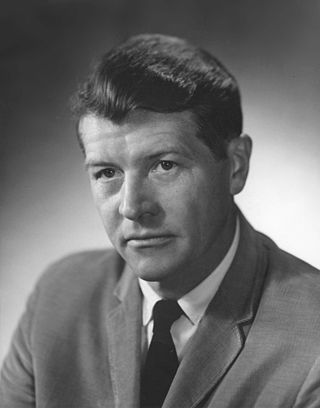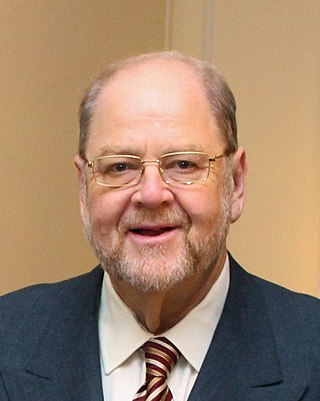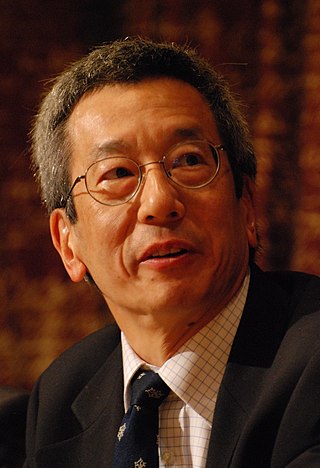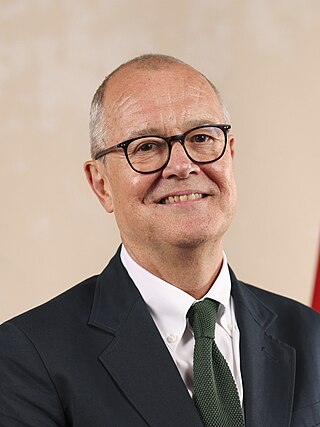
Barry James Marshall is an Australian physician, Nobel Laureate in Physiology or Medicine, Professor of Clinical Microbiology and Co-Director of the Marshall Centre at the University of Western Australia. Marshall and Robin Warren showed that the bacterium Helicobacter pylori plays a major role in causing many peptic ulcers, challenging decades of medical doctrine holding that ulcers were caused primarily by stress, spicy foods, and too much acid. This discovery has allowed for a breakthrough in understanding a causative link between Helicobacter pylori infection and stomach cancer.
The Stanford University School of Medicine is the medical school of Stanford University and is located in Stanford, California, United States. It traces its roots to the Medical Department of the University of the Pacific, founded in San Francisco in 1858. This medical institution, then called Cooper Medical College, was acquired by Stanford in 1908. The medical school moved to the Stanford campus near Palo Alto, California, in 1959.

The Rockefeller University is a private biomedical research and graduate-only university in New York City, New York. It focuses primarily on the biological and medical sciences and provides doctoral and postdoctoral education. It is classified as a "Special Focus – Research Institution". Rockefeller is the oldest biomedical research institute in the United States.

The Medical Research Council (MRC) is responsible for co-coordinating and funding medical research in the United Kingdom. It is part of United Kingdom Research and Innovation (UKRI), which came into operation 1 April 2018, and brings together the UK's seven research councils, Innovate UK and Research England. UK Research and Innovation is answerable to, although politically independent from, the Department for Business, Energy and Industrial Strategy.

Christian Boehmer Anfinsen Jr. was an American biochemist. He shared the 1972 Nobel Prize in Chemistry with Stanford Moore and William Howard Stein for work on ribonuclease, especially concerning the connection between the amino acid sequence and the biologically active conformation.

John Robin Warren was an Australian pathologist, Nobel laureate, and researcher who is credited with the 1979 re-discovery of the bacterium Helicobacter pylori, together with Barry Marshall. The duo proved to the medical community that the bacterium Helicobacter pylori is the cause of most peptic ulcers.

Susumu Tonegawa is a Japanese scientist who was the sole recipient of the Nobel Prize for Physiology or Medicine in 1987 for his discovery of V(D)J recombination, the genetic mechanism which produces antibody diversity. Although he won the Nobel Prize for his work in immunology, Tonegawa is a molecular biologist by training and he again changed fields following his Nobel Prize win; he now studies neuroscience, examining the molecular, cellular and neuronal basis of memory formation and retrieval.

James Edward Rothman is an American biochemist. He is the Fergus F. Wallace Professor of Biomedical Sciences at Yale University, the Chairman of the Department of Cell Biology at Yale School of Medicine, and the Director of the Nanobiology Institute at the Yale West Campus. Rothman also concurrently serves as adjunct professor of physiology and cellular biophysics at Columbia University and a research professor at the UCL Queen Square Institute of Neurology, University College London.

Sir Martin John EvansFLSW is an English biologist who, with Matthew Kaufman, was the first to culture mice embryonic stem cells and cultivate them in a laboratory in 1981. He is also known, along with Mario Capecchi and Oliver Smithies, for his work in the development of the knockout mouse and the related technology of gene targeting, a method of using embryonic stem cells to create specific gene modifications in mice. In 2007, the three shared the Nobel Prize in Physiology or Medicine in recognition of their discovery and contribution to the efforts to develop new treatments for illnesses in humans.
The Louisa Gross Horwitz Prize for Biology or Biochemistry is an annual prize awarded by Columbia University to a researcher or group of researchers who have made an outstanding contribution in basic research in the fields of biology or biochemistry.
The Heineken Prizes for Arts and Sciences consist of 11 awards biannually bestowed by Royal Netherlands Academy of Arts and Sciences. The prizes are named in honor of Henry Pierre Heineken, son of founder Gerard Adriaan Heineken, Alfred Heineken, former chairman of Heineken Holdings, and Charlene de Carvalho-Heineken, current chair of the Heineken Prizes Foundations, which fund all Heineken Prizes for Arts and Sciences. Thirteen winners of the Dr H. P. Heineken Prize for Biochemistry and Biophysics or the Dr A. H. Heineken Prize for Medicine subsequently were awarded a Nobel Prize.
The Ian Constable Lecture is an annual lecture given in Perth, Western Australia.

Roger Yonchien Tsien was an American biochemist. He was a professor of chemistry and biochemistry at the University of California, San Diego and was awarded the Nobel Prize in Chemistry in 2008 for his discovery and development of the green fluorescent protein, in collaboration with organic chemist Osamu Shimomura and neurobiologist Martin Chalfie. Tsien was also a pioneer of calcium imaging.
UCL Neuroscience is a research domain that encompasses the breadth of neuroscience research activity across University College London's (UCL) School of Life and Medical Sciences. The domain was established in January 2008, to coordinate neuroscience activity across the many UCL departments and institutes in which neuroscience research takes place. In 2014, the Nobel Prize in Physiology or Medicine was awarded to the UCL neuroscientist John O'Keefe. In two consecutive years 2017 and 2018, the Brain Prize, the world's most valuable prize for brain research at €1m, was awarded to UCL neuroscientists Peter Dayan, Ray Dolan, John Hardy, and Bart De Strooper.
Hugh Edward Montgomery is an English professor of medicine and the director of the Centre for Human Health and Performance at University College London. He discovered that an allele of the gene with the DNA code for angiotensin-converting enzyme (ACE) influences physical fitness; this was the first discovery of a gene related to fitness.
Richard Winyu Tsien, is a Chinese-born American electrical engineer and neurobiologist. He is the Druckenmiller Professor of Neuroscience, Chair of the Department of Physiology and Neuroscience, and Director of the NYU Neuroscience Institute at New York University Medical Center, and also an emeritus faculty member of Stanford University School of Medicine.
The Massry Prize was established in 1996, and is administered by the Meira and Shaul G. Massry Foundation. The Prize, of $40,000 and the Massry Lectureship, is bestowed upon scientists who have made substantial recent contributions in the biomedical sciences. Shaul G. Massry, M.D., who established the Massry Foundation, is Professor Emeritus of Medicine and Physiology and Biophysics at the Keck School of Medicine, University of Southern California. He served as Chief of its Division of Nephrology from 1974 to 2000. In 2009 the KECK School of Medicine was asked to administer the Prize, and has done so since that time. Out of 25 prizes bestowed until 2021, fourteen were awarded to future Nobel Prize winners. No Massry Prize was awarded in 2020, 2022 and 2023.
The American Association of Immunologists (AAI) is an international scientific society dedicated to furthering the study of immunology. AAI provides its members with a variety of platforms in which to exchange ideas and present the latest immunological research, including the AAI annual meeting and The Journal of Immunology. In 2017, AAI launched an open-access journal, ImmunoHorizons. AAI is a founding member society of the Federation of American Societies for Experimental Biology (FASEB).

Patrick John Thompson Vallance, Baron Vallance of Balham, is a British physician, scientist, Life Peer, and clinical pharmacologist who serves as Minister of State for Science in the Department for Science, Innovation and Technology since July 2024. He previously served as HM Government chief scientific adviser from 2018 to 2023.









